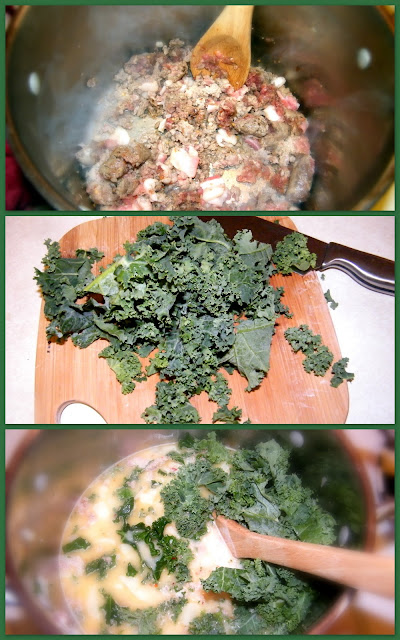Zuppa???
Well, zuppa is Italian for soup, one of our cozy, tasty and savory favorites no matter what kind it is, especially when there’s cold out side! Welcome back to this week’s Sizzlin’ Soup Series, this week I am hosting the soup of the week.
For the next 5 weeks, we will be sharing with you our favorite cozy soups. Not to mention, each soup will use good, wholesome ingredients! At the end of the 6-week series, we will have a surprise for you.
*hint: it’s FREE* Any guesses?
To be sure you don’t miss out, consider subscribing to day2day joys, or any one of these participating blogs:
Leigh Ann @ Intentional by Grace (she hosted last week, check her soup out here)
Nikki @ Christian Mommy Blogger
Erin @ The Humbled Homemaker
Anne @ Quick and Easy Cheap and Healthy
Mindy @ The Purposed Heart
You may have heard of zuppa if you have ever dined in an Italian restaurant, whether it was in your home town or even in Italy. This is my rendition of the Italian favorite Zuppa Toscana, which can be made creamy or not, spicy or not and fabulous or ….just joking! The rendition is not creamy or spicy, but is fabulous. Ask anyone, I don’t do super spicy, I’m a wimp, you make it as spicy as you want!
What you Need:
4 russet potatoes, peeled and chopped
1 small onion, diced
3 cloves garlic, minced
homemade chicken broth
2/3 c regular sausage
2 nitrite/nitrate free spicy cajan sausage links
3-4 strips of nitrite/nitrate free bacon, chopped
4 handfuls of kale
1 TBS crushed red pepper
1/2 c heavy cream or milk
season with salt (and pepper if needed but probably won’t need it)
*note: the spicy cajun is SPICY, so this would also we great made with Italian sausage for those wimps out there!
What to Do:
- Saute all of the meats in a stock pan, once they are browned, add in the diced onion, garlic, crushed and red pepper, mix
- Pour in the chicken broth and the heavy cream, bring to a boil, then reduce heat to medium- low
- Add the potatoes and the handfuls of kale
- Cover and continuing cooking until potatoes are softened (about 20+ minutes)
- Serve in a bowl and enjoy! (add a dollop of sour cream if it’s too spicy… I did that, but remember I am a wimp!)
Hope you enjoy this soup! Let me know if you are a wimp too! 😉 Be sure to check back next week; Nikki over at Christian Mommy Blogger will be serving you up a fantastic sizzlin’ soup you’ll love!
Have you been sizzlin’ up any soup at your house this week?





















Great Post, Jenna! I definitely need to start eating seasonally! It is much easier on the budget! ~Angela
Although I don’t always eat 100% in season, I definitely agree that it’s the best way to go. Great post, Jenna! 🙂
Thanks for the great post, Jenna! I agree that in season is best! It is harder in the winter months (b/c I can’t seem to go long without some of my favorites–haha!), but I strive to do it even then. Thanks for the reminders!
I also need to do this more! I caved and bought some “out of season” fruit the other day for Lincoln because he was begging for it… who knows how many miles it took to get shipped here.
Thanks for reading the post today everyone! I think sometimes we see winter as a bad time for eating fresh produce, but really it can force us to explore options like pomegranates, root veggies, beets, brussel sprouts, and definitely the citrus fruits… that I don’t generally run toward in the store. I think that’s how God designed us – to be in rhythm with how he created things. The reason for this post was b/c I did pick up some strawberries the other day and read that they came from Cali… I’m in Ohio… it got my mind going… 🙂
I would love for you to link this info up to my Famous Linkz Party! http://www.made-famous-by.com
Hugs,
Heather aka Made Famous By
I do love eating in season, although I don’t strictly 100% avoid out-of-season produce. I’ve found, though, that the off-season produce does not taste nearly as good as fresh and in-season. Part of my problem is that my husband cannot eat a lot of the fruits and vegetables that are in season through the winter, other than the root vegetables, so we get kind of stuck.
Jenna, It does make sense to eat with the seasons. We have grown our own food (much of it, produce-wise) and so we are forced to follow the flow of god’s design. Thank you for your nice post!
Hi Jenna! Thanks for writing this great post on eating with the seasons, if you know my blog you’d see I am a total advocate of the same principles as you spell out here so beautifully. Thank you.
I’m hosting a weekly linky over at Natural Mothers Network which is all about seasonal celebration and would love it if you popped over and linked this post! It would be great to introduce your blog to my subscribers! Seasonal Celebration Linky http://naturalmothersnetwork.com/seasonal-celebration-sunday/seasonal-celebration/ Really hope to see you there! Rebecca x